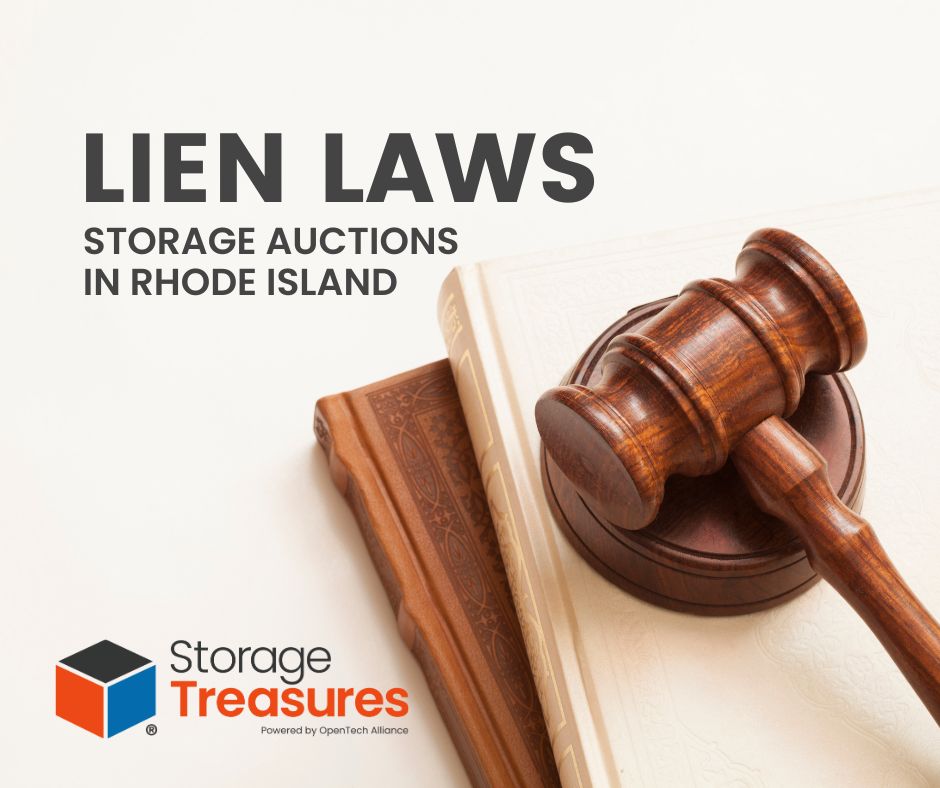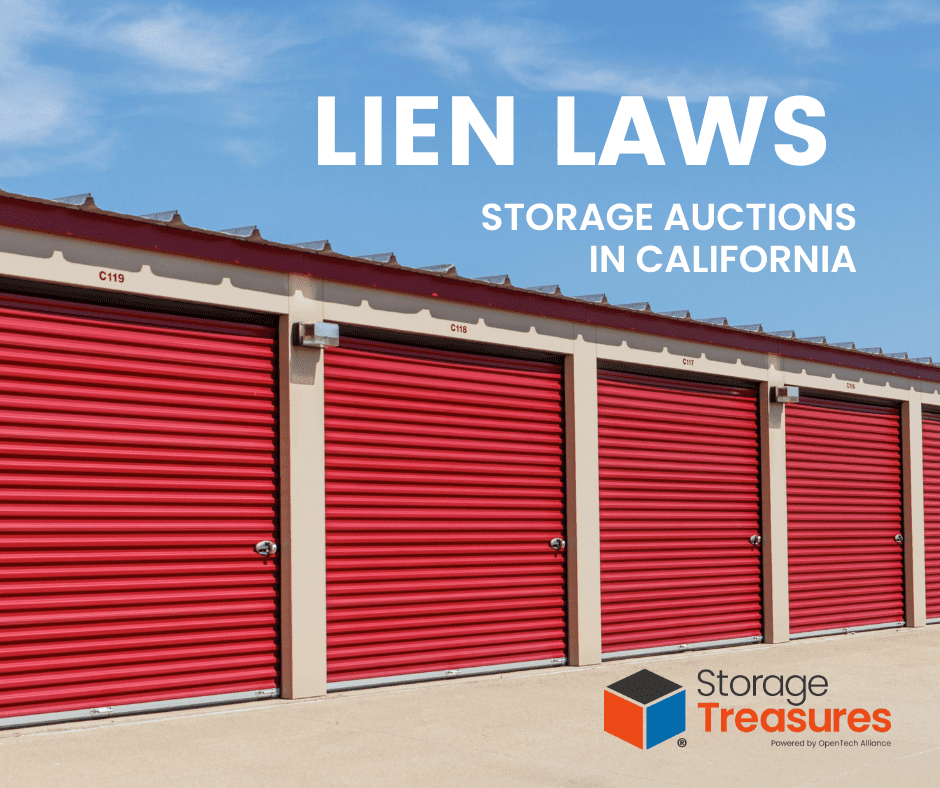Understanding Lien Laws for Storage Auctions in Rhode Island
Most people in the self –storage industry accept that lien laws can be vague and confusing. However, the lien laws for storage auctions in Rhode Island are exceptionally challenging to understand and have confused people in the past. Luckily, the laws were recently updated to be more straightforward and to shorten the enforcement timeline. Senate Bill 366 passed the Rhode Island House of Representatives and became a law on June 27, 2023.
Definitions
Many people tend to overlook definitions as part of the statute. A storage operator must pay close attention to each definition in the statute since the definitions section might contain important information that directly affects their operations. For instance, Section 34-42-2 (1) defines an abandoned lease space, which helps the operator determine if a unit is abandoned or not based on whether it’s empty with the lock removed or if the tenant has surrendered the property by signing an abandonment form.
This definition means you can conclude that a unit is abandoned in two ways. The first way is to find the unit empty with the lock removed. The second way is if the tenant has surrendered the property to you by signing an abandonment form.
It is essential to pay close attention to each definition in your statute.
Owner’s Lien
The owner of the storage facility and their heirs have a lien on the personal property located at the facility to recover rent and other fees owed during the rental period. This lien attaches the date the property is moved into the facility. The designation of an attachment date implies that the operator must determine if other liens were filed before the storage lien.
There is also a reference to sending all notices to lien holders later in the statute. This reference, again, implies that you must discover if there are any additional lien holders. You can do this by conducting a Uniform Commercial Code search.
Upon default, the owner can deny access to the storage facility and begin to enforce the lien through three presale notices and a legal ad.
First Notice – Late Notice
The first Notice of Default is like a late fee notice. However, the first notice requires specific elements and specific forms of delivery. You can send the 1st notice no sooner than five days after default. It must be delivered in person, by regular mail, or by verified email. If you choose to send this notice via email, you must receive a response, read receipt, or delivery confirmation. If you do not have one of these items, you must resend the notice using regular mail.
The notice must provide the balance due at the time of notice and a reminder to bring the account current or face lien enforcement. It is essential to note that the statute says you must also send this notice to “all other persons known to claim an interest in the property.” It is a good idea to provide your tenants with space to disclose any lien holders in the rental agreement. If you do not have this provision in your rental agreement, you should conduct a UCC search for each tenant going to auction.
Second Notice – Notice of Default
No sooner than 14 days after default, you can send the 2nd notice. This letter will contain your auction date and other information relevant to the sale.
This letter must include the following information.
- A statement of the claim showing the sums due at the time of notice
- A statement that reads “based on default, the owner has the right to deny the occupant access to the leased space”
- A general description of the property stored
- A demand for payment not less than 14 days after the date of the 2nd notice
- A CONSPICUOUS statement that “unless the claim is paid by the specified date, the occupant’s right to use the storage space will terminate, and the personal property will be advertised for sale or will be otherwise disposed of at a specified time and place”
- The name, street address, and telephone number of the owner whom the tenant can contact to respond to the notice
The 2nd notice must be delivered in person, by regular mail, or by verified email. However, the way you send the 2nd notice determines if you need a third notice. If you cannot prove that somebody delivered the notice in person or via certified mail with a return receipt, you must provide a third notice via a newspaper publication. Most often, facility owners will not have the notice delivered in person or get a Return Receipt in the mail and will need to move forward to the third notice.
Third Notice – Notice of Sale Via Publication
The Rhode Island legislature changed this requirement with the recent statute updates. Before the August 2023 changes, this notice by publication had to run for three consecutive weeks in a newspaper of general circulation. Now, owners are only required to run the publication once in a newspaper of general circulation in the city or town of the tenant’s last known address.
The 3rd notice by publication must include the total amount due and a demand for payment at least 20 days from the notice publication. This demand for payment is longer than the demand for payment required in the 2nd notice if it is delivered in person or verified with a certified mail return receipt. You must figure this additional time into your enforcement checklist. If you need to provide notice by publication, you must wait the full 20 days, rather than the 14 days required in the 2nd notice, before you can run your legal ad.
Legal Advertisement
Once the demand for payment time expires in your notices, you must run a legal ad once a week for two consecutive weeks on “a publicly accessible website identified in your rental agreement.” The legal ad must contain the tenant’s name and the time and place of the sale. Your sale cannot occur sooner than ten days after the first legal ad.
Lien Sale and Excess Proceeds
The lien sale can take place at the facility or online. If the sale generates excess proceeds, those funds must belong to the tenant. We recommend that you send them a notice via verified mail letting them know they have two years to claim the overage.
Towing Motor Vehicles
“If the personal property in the leased space is a motor vehicle, watercraft, trailer, motorcycle, RV, or any other titled vehicle, the owner may have it towed with no liability on its part.” Notice there are no other requirements to meet before towing the vehicle. You should wait an appropriate amount of time before having the vehicle towed. Thirty to 60 days is the industry standard waiting time.
Although not legally required, it would be favorable for you to notify your tenant that the vehicle was towed and who they can contact to recover it.
Rental Agreement Contents
Finally, the statute provides a list of items for you to include in your rental agreement per the statute. They are as follows.
- That the property stored in the leased space is not insured by the owner against loss, theft, or damage.
- The existence of the lien under this chapter.
- That property stored in the leased space may be sold to satisfy the lien if the occupant is in default.
The statute of storage auctions in Rhode Island is complex and includes overlapping dates and procedures. A few essential items you should take away from this article are below.
- If your 2nd notice is not confirmed to be delivered in person or by certified mail with a return receipt signed, you must provide the 3rd notice via publication in a newspaper of general circulation.
- Delivery via verified email does not suffice to eliminate the notice via publication.
- If the notice by publication is required, you cannot run your legal ad until 20 days after the publication.
- If notice by publication is not required, you can run your first legal ad no sooner than 14 days after you send the notice.
- If using a publicly accessible website to run your legal ad, it must be stated in your rental agreement.
The National Self Storage Association has an excellent resource to help you navigate the storage auctions in Rhode Island Statute. The booklet is very affordable.








